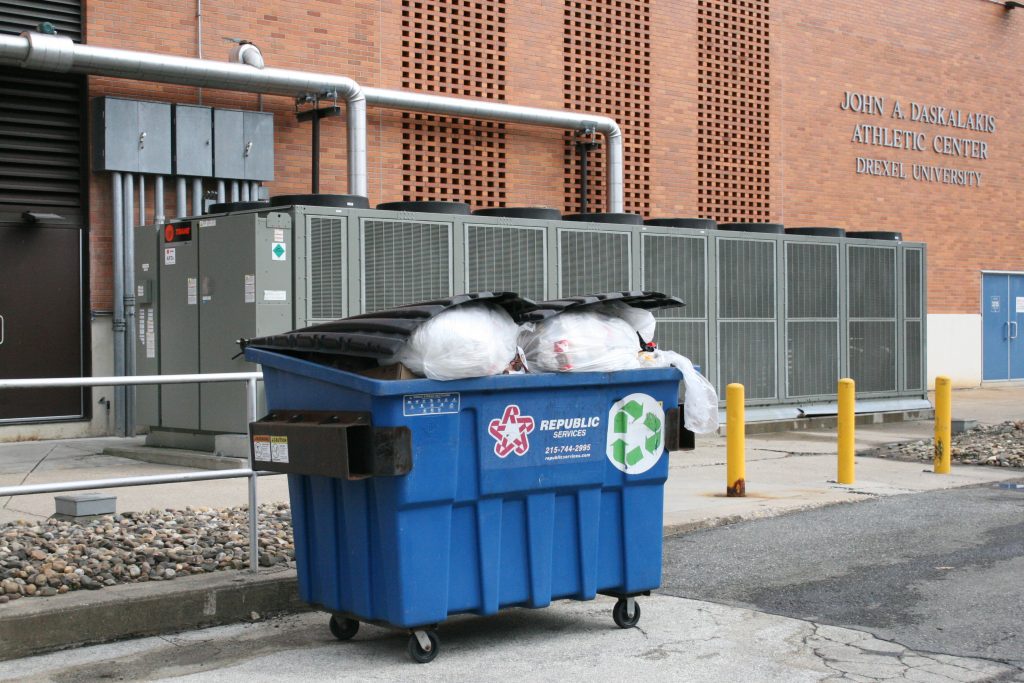
For the months of February and March, Drexel University is participating in the Campus Race to Zero Waste TM, a recycling competition aiming to “inspire, empower, and mobilize colleges and universities to benchmark and improve efforts to reduce or eliminate waste.”
130 institutions from across the USA and Canada are competing in 15 different categories for exclusive bragging rights, awards made of recyclable materials and the right to host that category’s trophy for the next year. Another 21 institutions, including Drexel, are just benchmarking their results and not competing in the official rankings. Managed by the National Wildlife Federation, the program provides tools and guidelines for campuses to measure their waste production and diversion, which is then publicized on a live scoreboard for “a fair and friendly competition.”
From 2016 to 2021, while it was included in the complete report, Drexel had a steady increase from 23 percent to 39 percent of waste that was diverted from landfills to recycling, i.e., the recycling rate. Last year’s highest recycling rate was achieved by Loyola Marymount University in Los Angeles, California with a rate of 77 percent. As of writing this article, Seattle University is leading this year’s competition with a current rate of 72 percent. Last year, participating campuses diverted an amazing 29.4 million total pounds of waste.
Drexel is continuing its tradition of focusing on the electronic waste category, which will have its rankings released in April. As the main push of the campaign, Real Estate and Facilities will be hosting one e-waste pickup at each campus from March 19 to 21. The exact schedule is available on Drexel’s webpage for the campaign.
Students, faculty and staff will be able to bring any “electronics, computer equipment, old and used up toner and ink cartridges and batteries of all kinds” to be recycled as e-waste.
It should be noted that only computers that have been properly wiped of all data will be accepted.
Bo Solomon, executive director of Drexel Climate & Sustainability, stated, “this e-waste collection has been [their] focus [for the CR2ZW] since 2016, with more than 17,000 pounds collected in 2023.”
Drexel departments year-round are able to put old electronic equipment up for auction through Drexel Surplus Property, but Solomon says many items, such as “hard to sell, older electronics that have gone past their useful lifecycle” need to be recycled as e-waste instead.
This yearly collection serves to fill in that gap.
E-waste is one of the most dangerous and under-recycled forms of waste, despite being the fastest growing form of solid waste. According to the International Labor Organization and World Health Organization, there are millions of women and children at risk of exposure to toxic e-waste pollution across the world. Millions more are exposed to the harmful effects of rare earth element mining for the manufacture of new electronics.
E-waste recycling, which according to Solomon “has always been a large part of Drexel recycling efforts,” is a small but important step towards more ethical and sustainable electronics consumption.
Competing institutions in the CR2ZW record complete waste production and diversion measurements every single week of the eight-week competition.
As a team of only “two FTE employees and a co-op student,” Solomon explained that such comprehensive reporting was outside the scope of possibility for them, which is why Drexel focuses on a specific category.
The small team handles a surprisingly large number of events and initiatives throughout the year, which Solomon said include “AASHE STARS reporting, the Climate Action Plan, working with EcoReps, holding [their] annual Songwriting competition, hosting EarthFest, manning the Buy Nothing Depot and helping to reduce plastic water bottle usage.”

